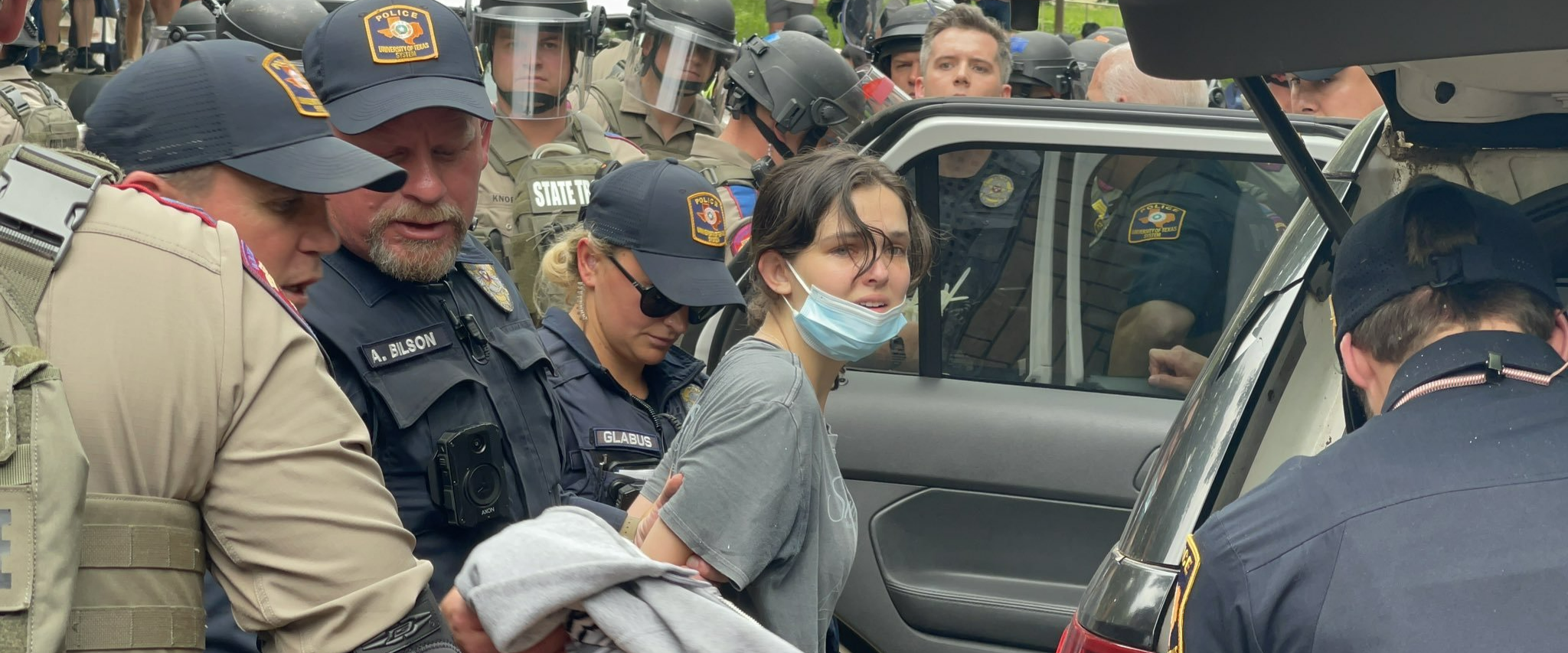What I Don’t See in Student Protests over Gaza

The historical significance of a movement sometimes lies not in its outcomes, but rather in the ideals, energy, and compassion of the youth, which are often indispensable parts of historical trends. The series of protest in support of Palestine taking place in American universities will undoubtedly be remembered in history.
On November 10, 2023, Friday, at Brandeis University in Massachusetts, United States, as I was leaving work and walking through the campus, I saw students being escorted into police cars from my car window. Beside them, fellow students were angrily crying out. In the distance, more students watched silently, unsure how to react, just like me.
 “New Lady Liberty”created by Chinese artist @FangziChina
“New Lady Liberty”created by Chinese artist @FangziChina
Later, I learned that seven people were arrested. The professors were informed that the university administration had decided to call the police because the protesting students were chanting “From the river to the sea” (a slogan historically associated with the Palestinian Liberation Organization) and “Intifada” (Arabic for “uprising”). In this university with Jewish traditions, these two slogans were deemed “anti-Semitic,” posing a threat to the safety of Jewish faculty and students.
Around the same time, a Jewish colleague told me that their children, who hold Israeli citizenship, might receive conscription notices. Almost all the Jewish colleagues I knew were consistently opposed to the Netanyahu government. However, the Netanyahu government had become a wartime cabinet. Every time the university administration defended their decision to suppress student protests, they passionately mentioned the indiscriminate killings caused by Hamas on October 7. They particularly mentioned a friend of a friend, a left-wing couple who advocated Israeli-Palestinian reconciliation but fell victim to Hamas violence. Jewish students hung blue Star of David flags on their dormitory windows. Student organizations posted photos of abducted or missing Israelis, each photo marked as “confirmed dead.” Ramadan arrived, and the university administration sent a message to all professors, calling for support for Muslim students observing fasting during Ramadan and helping them celebrate Eid al-Fitr.
A professor of Iranian descent expressed to the university administration that Muslim students felt helpless both inside and outside the classroom in Middle Eastern studies.
Some time ago, my wife donated to international humanitarian organizations providing assistance to Gaza. The personnel of these organizations also suffered casualties. Or perhaps, on the ruins of the path leading to the aid distribution point, a Gaza child was shot and killed. Such news appeared on the radio during my commute to the university.
In late April of this year, while the protest movements at other universities suddenly gained momentum, Brandeis University was already observing the Jewish holiday of Passover.
From November of last year to the clearing of Columbia University today, how many Gazans have died? On April 30, 2024, it was cloudy and windy, and New England was still not warm. Harvard Yard remained closed. International tourists arriving on buses could only take photos of this globally renowned campus from behind fences using their phones. They were not taking pictures of the famous Harvard sculptures as mere internet-famous spots but rather—tents.
With my Harvard University library card, I went inside to take a look at the students’ encampment movement. How quiet it was because outsiders couldn’t come in. Students were busy working on their final assignments inside and outside the tents. Around the Harvard sculptures, some students were talking quietly, while others wearing masks and fluorescent vests were on duty on the lawn. More people were sitting with their computers, scrolling through their phones, reading books, and drinking coffee, then posting newly drawn posters below the school’s disciplinary warning signs.
A student told me, “From the river to the sea,” is not only not anti-Semitic but a peace slogan.
Immediate ceasefire, Gaza is bleeding, Palestinian freedom — these slogans stem from basic concerns for humanity and justice.
More specific demands, at Harvard and elsewhere, include the school severing financial ties with Israel and not punishing protesting students after the fact.
Almost all major newspapers in the United States, in their platitude and condescending tone, mock the students’ demands as completely ignorant of how schools operate, childish and trivial. (But if that’s the case, why doesn’t the university engage in a meaningful dialogue with the students? Do they have to wait for the students to propose more radical demands?) Harvard students have plenty of fast food and coffee. They don’t lack supplies. They decline donations. They are worried that online donations might cause trouble for donors. Indeed, a columnist for The Washington Post has already called for an in-depth FBI investigation. At noon, a choir (mostly composed of Black members) came to support the students and sang, bringing warmth and liveliness to the campus. Beyond Brandeis, many American universities take a formalistic approach, saying that “from the river to the sea” is incitement but may still be protected by the First Amendment as long as it doesn’t result in violence.
Does turning every issue into a First Amendment issue amount to avoiding the problem?
The students at Columbia University have expressed the real issue through their actions — national liberation.
The truth has been uncovered, and the reasoning has split.
This is the language of action, and American society will surely respond with police action.
I took the commuter rail back home from Harvard, and news came that Columbia University was about to be cleared by the NYPD (New York City Police Department). Students occupied Hamilton Hall, where the Classics department is located (I have been there before when I studied at New York University, but I can’t remember if there were other departments).
Through translating “Walter Benjamin: A Biography,” I gained some indirect knowledge of the intellectual history of the Zionist movement. I have also read works by many Jewish-European thinkers and writers similar to Walter Benjamin. Recently, I have been preparing lecture notes for a seminar on Benjamin and sometimes wonder: If Benjamin were here today, how would he view all of this?
These are random thoughts. But this student movement has indeed connected many fundamental frameworks of the world over the past century: the Jewish question, the United States and hegemony, war and peace, youth issues, university issues, national liberation issues…
The truth has been uncovered, and the reasoning has split.
The historical significance of a movement sometimes lies not in its outcomes but in the fact that it not only superficially evokes historical comparisons (aren’t the American mainstream media all “cueing” 1968?), but it essentially renders certain frameworks of historical comparison ineffective.
As of the time of writing, according to the latest news, the clearing operations at Columbia University and other locations in New York City have resulted in approximately 300 arrests. Some people online in the United States have praised the professional restraint of the New York Police. Others have compared the handling of protests between universities on the East and West Coasts and different cities, and lamented that confrontation seems almost inevitable. Meanwhile, The New York Times suddenly discovered that student protesters across the country have attempted to link the issue of Palestine with many other injustices around the world.
https://mp.weixin.qq.com/s/w9Ej_E-ht2oSOS-ZpwHR5Q




